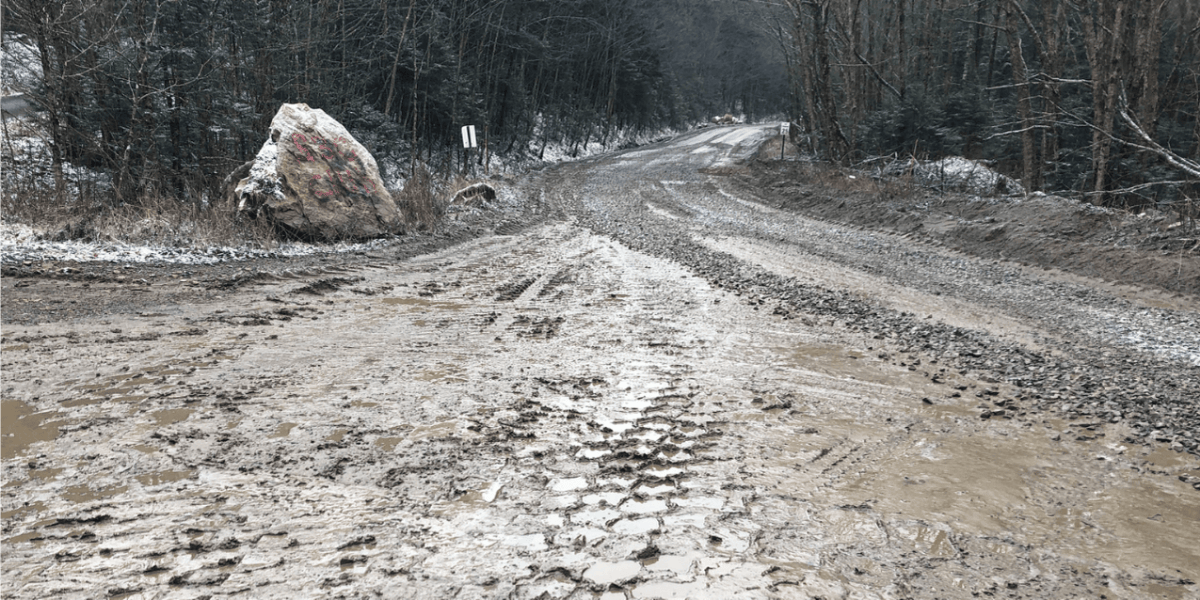On Dec. 12, 11 conservation organizations urged the federal Office of Surface Mining Reclamation and Enforcement to take immediate action to close an illegal coal haul road in the Monongahela National Forest in Greenbrier and Pocahontas Counties, West Virginia. In a letter addressed to the agency’s leadership, the groups explained that South Fork Coal Company falsely claimed that its Haulroad #2 would not enter national forest land when it obtained its state mining permit in 2011. Under federal law, surface coal mining operations and impacts are prohibited in the national forest unless a coal company had “valid existing rights” established prior to the passage of the Surface Mining Control and Reclamation Act of 1977.
Haulroad #2 is used to truck coal from South Fork Coal Company’s 1,200-acre Rocky Run Surface Mine to a coal preparation plant near Rupert, West Virginia. Both the road and the mine discharge pollutants into designated critical habitat for the endangered candy darter in the South Fork of Cherry River. Both have been cited numerous times in recent years for various environmental violations, including failures to control sediment and prevent pollutants from entering adjacent waterways.
The Rocky Run Surface Mine and Haulroad #2 are about six miles from the popular Cranberry Glades Wilderness Area and only two miles from the Falls of Hills Creek Scenic Area. The South Fork of Cherry River and its tributaries are pristine headwater streams that ultimately flow into the Gauley River, a world-class whitewater rafting, kayaking and tourism destination.
Many of the conservation groups signed onto today’s letter are currently engaged in litigation with the U.S. Forest Service, U.S. Fish and Wildlife Service and Office of Surface Mining Reclamation and Enforcement over failures to enforce the Endangered Species Act, National Environmental Policy Act, Administrative Procedure Act, and Surface Mining Control and Reclamation Act requirements with respect to South Fork Coal Company’s operations and their impacts upon public lands, the endangered candy darter, and its protected critical habitat.
The letter was penned by Andrew Young, an attorney with the Allegheny-Blue Ridge Alliance, on behalf of West Virginia Highlands Conservancy, Appalachian Voices, Greenbrier Watershed Association, West Virginia Native Fish Coalition, Coal River Mountain Watch, the Kanawha Forest Coalition, Christians for the Mountains, the West Virginia Chapter of the Sierra Club, West Virginia Rivers Coalition and the Alliance for Appalachia.
In the letter, Young explained how South Fork Coal Company failed to disclose that Haulroad #2 would cross national forest land. The company only attempted to make the case that it possesses “valid existing rights” to operate the road after the West Virginia Highlands Conservancy alerted federal officials of the matter over the summer. OSMRE is now investigating whether the company holds these rights.
The conservation groups are asking OSMRE Deputy Director Sharon Buccino, an environmental attorney currently running the agency, to issue an order halting coal hauling on the road until that determination is made.
“South Fork Coal Company has turned our national forest into its own private industrial roadway, endangering wildlife, waterways and entire communities,” Young said. “This is a blatant betrayal of our environmental laws — and an insult to everyone who treasures public lands and iconic Appalachian species like the candy darter. OSMRE and Buccino now have a defining opportunity to show that federal safeguards for public trust resources are more than hollow promises — close this illegal route today and prove to the nation that our forests, our wildlife and our communities will not be sacrificed for King Coal.”
“West Virginia’s forests and waters are the backbone of a blossoming ecotourism economy — one that supports local businesses and uplifts entire communities,” said Willie Dodson of Appalachian Voices. “There is a little over a month left in this administration. Deputy Director Buccino must seize this moment to stand up for our national forests and for the communities of the Cherry River watershed. Protecting the Monongahela shows the country that we value our natural heritage, our wildlife and the livelihoods of those who depend on a healthy environment.

